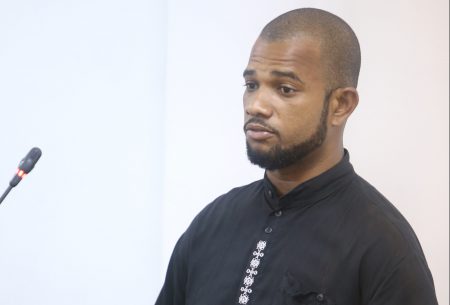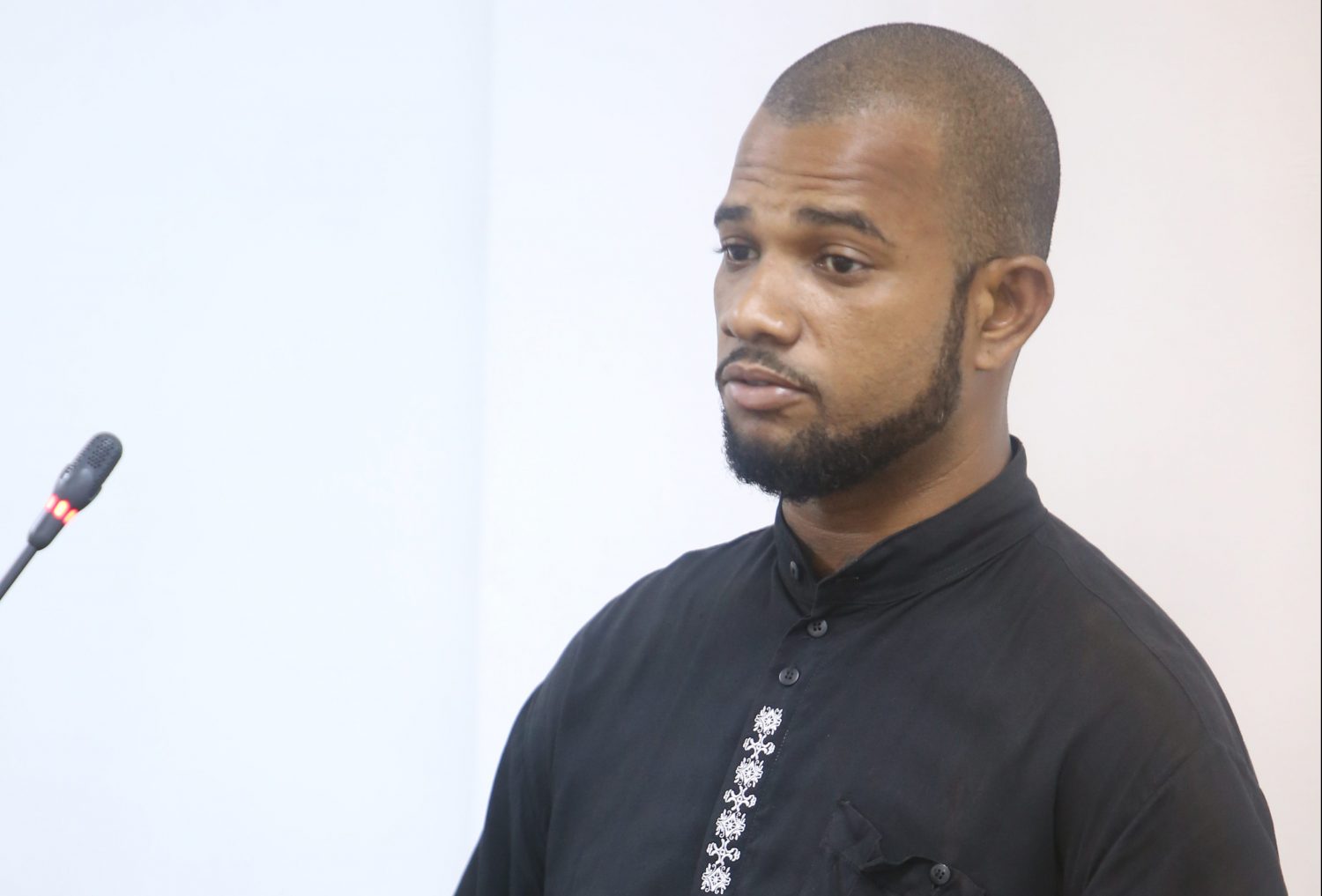A Commission of Inquiry (CoI) into an alleged plot to killed President David Granger wrapped up yesterday with a scathing attack on the accuser, Andriff Gillard, by counsel for the police, Ian Chang SC
Retired Justice Chang concluded during the presentation of his oral submissions before the CoI that all the evidence in the case of the alleged presidential assassination plot points to fabrication and recent concoction.
Yesterday’s hearing marked the final day of the CoI established to investigate the circumstances surrounding an allegation made by Gillard in March of this year against businessman Nizam Khan. Gillard reported to police that Khan had offered him $7 million in 2015 to assassinate President David Granger.
Gillard was present for most of the proceedings yesterday but left during the break and did not return.

Chang told the commission that Gillard not only had motive, but that his failure to report the plot allegation to the police during the numerous opportunities he was afforded in the 21 months before his visit to CID, were “intrinsic weaknesses” and challenged the credibility of his claim.
He recalled that there is evidence before the commission that Gillard had “malicious motive” for such an invention, including reports that he had accused Khan of being in a relationship with his wife, and that he believed Khan was behind a property dispute Gillard had with a Stephen Persaud, who lived adjacent to Khan. Gillard was eventually removed from the property.
In relation to the latter, Chang noted that the issue in that regard was not whether the matter was true, but rather, Gillard’s belief that Khan was behind the incident involving Persaud.
Up the ante
Prior to Gillard’s report in March against Khan, Gillard had gone to the police to report the businessman in relation to another matter.
Chang used this incident to challenge Gillard’s claim that the reason he had not gone to the police before about the assassination plot was because he was afraid of Khan. The attorney made reference to the matter, in which Gillard had alleged that Khan pulled a gun on him and threatened to kill him. This was reported to have occurred last year when Persaud attempted to retrieve a battery Gillard had borrowed.
According to Chang, when Gillard saw that his previous allegation that Khan had threatened his life did not bring police action, he had to “up the ante.”
“He found (reporter) Travis Chase to be a willing collaborator. Chase was simply used and abused by Gillard for his personal vendetta against Khan…,” Chang said.
Gillard had reportedly called Chase on March 26th and told him of the allegation. It was not until March 30th, however, that the news anchor interviewed him.
The attorney opined that Chase was an easy victim because he held personal grudges against the police and so was “perfect” for forwarding Gillard’s agenda.
“Chase was played like a fiddle perhaps without even becoming aware…a review of the audio/video recording recorded by Travis Chase will reveal that Travis Chase was attempting to significantly embellish Gillard’s false story,” Chang stated, relating that Chase’s claim that the plot was to assassinate the president was planned for one of his outreaches which was never mentioned in Gillard’s statement.
“This commission must not allow itself to fall victim to this storm in a teacup falsity, created by Andriff Gillard, aided and abetted by Travis Chase,” the attorney declared.
The plot
“You see the plot is this. This is Gillard the planner…If, on the 26th (Leon) Baldeo had taken that offer…if he had taken that offer and go to the police station and say that he was present when Nizam Khan offered Gillard $6 million to assassinate the president…Nizam Khan’s goose was cooked.”
“We would have had…Leon Baldeo, who would have had no motive to lie on Nizam Khan going to the police station and saying I was present when this offer was made to Gillard by Nizam Khan. Naturally, the police would have had to contact Gillard. All Gillard would have had to do is to confirm. He would not have been the reporter.”
Chang reasoned that the initial plan was not for Baldeo to corroborate Gillard’s story, but the other way around.
The attorney went on to point out that on that the day following Gillard’s offer to Baldeo, a report was made against Gillard at the Grove Police Station by Stephen Persaud.
“Gillard had to change gear…Gillard now decide, he had to make the allegation himself. He had no time to get another Leon Baldeo, somebody like Leon Baldeo to accept the offer for $50,000 to go and lie. He had to do the thing himself.”
He further stated that on the night of the 28th Gillard made the report to Travis Chase that he had been offered $6 million to kill the president.
He noted that by the time Gillard made his way to the Ministry of the Presidency the next day (March 29th), his story in relation to the assassination offer had changed from $6 million to $7 million. Chang added that this change is significant to the commission, and asked that the commission be “insightful” when analyzing the evidence.
He noted that both Chase and Baldeo spoke about $6 million, and stated that the two could not have been colluding on the amount.
No fault
Chang argued that the issue of bail being granted to the accused in the matter, Nizam Khan, was not a question of wrong or right, but rather, what was reasonable.
He noted that a distinction should be made between arrest and refusal of bail, pointing out that the police took immediate action in arresting Khan. He said that apart from the gravity of the offence, the police must also depend on the evidence presented, which in this case, pointed overwhelmingly to fabrication.
In Chang’s opinion, the decision to place Khan on bail on the same day of the allegation was “in order” and cannot be viewed as unreasonable as he said the evidence, from the beginning, pointed to the allegation being false and maliciously motivated. He advised, in this regard, that the commission not look at the issue subjectively and stated that the person that put Khan on station bail “cannot be faulted”.
Chang asserted that if persons were detained based solely on the seriousness of a matter, many persons would become empowered to use that tactic against individuals they hold grudges against, resulting in a possible abuse of the agency.
He noted that credibility is not automatic just because an allegation involves murder or treason.
He further noted that when Khan was placed on bail on the night of March 29, a confrontation had already been held between Khan and Gillard, and Gillard had already given the police a lengthy statement, and further statements subsequently. Furthermore, Khan had already been questioned by senior ranks of the special branch before his release.
He said that the fact that the investigation could not be completed within 72 hours, as stated in witness testimonies, “spoke loudly” to why bail should have been granted. In addition to this, there was the issue of weaknesses in Gillard’s statement, and the fact that of the subsequent witnesses who came forward to debunk his allegation, the earliest statement (Leon Baldeo’s) was given as late as six days after, and the last (Louanna Walker’s) as late as July 19th.
Chang argued that the witnesses, Baldeo, Lloyd Adams and Walker, who were acquaintances of Gillard and in no way associated with Khan, would have come forward anyway.
Chang related that he could not see how Khan’s release had compromised the investigation, as Gillard himself had said in his statement to police that only the two of them were present when the proposal was made.
Chang contended that the only thing that has been corroborated in the case is Khan’s denial of the allegation, rather than the truth of Gillard’s story.
Chang submitted that the investigators at the CID “went where the investigations took them” and that no sides were taken while the matter was being investigated.
He noted too that anyone who has knowledge of treason and does not report it is guilty of misprision of treason, but pointed out that the police did not see fit to hold Gillard for such as they were of the view that his story lacked credibility.
In relation to the issue of disorderly behaviour at the CID involving Imran Khan, Nizam’s brother, Chang related that the offence is punishable by fine of not less than $10,000 or not more than $20,000, therefore, Imran Khan had to have been granted bail.
Authority
Addressing the authority attributed to Assistant Commissioner of Police David Ramnarine while Commissioner of Police Seelall Persaud is on leave, Chang said that the power and authority of the Commissioner of Police always remained vested in Persaud as Ramnarine was never legally appointed.
He related that according to Article 210 (2) of the Constitution, a person can only be appointed to act in an office if the position is vacant or the holder is unable to function in their office, which was not the case during the period in question.
He noted that this would have been different had Persaud been on pre-retirement leave.
He stated, therefore, that Persaud had the administrative power and authority to grant bail to Nizam Khan, Imran Khan or Gillard as there was “more than sufficient factual basis” for him to do so, but acknowledged that whether an instruction was really was passed is up for question.
The weeks-along inquiry also unveiled deep differences in the police hierarchy.






